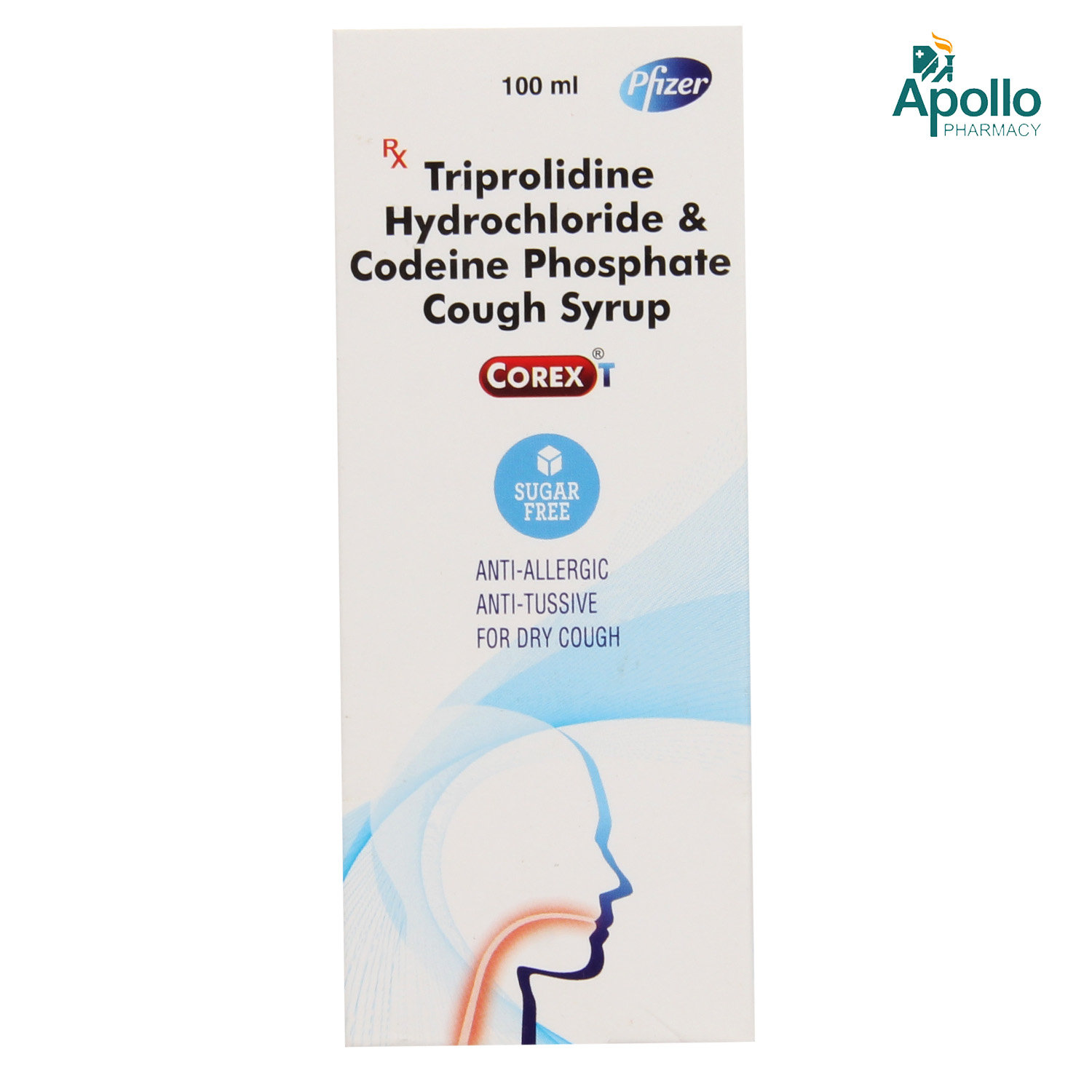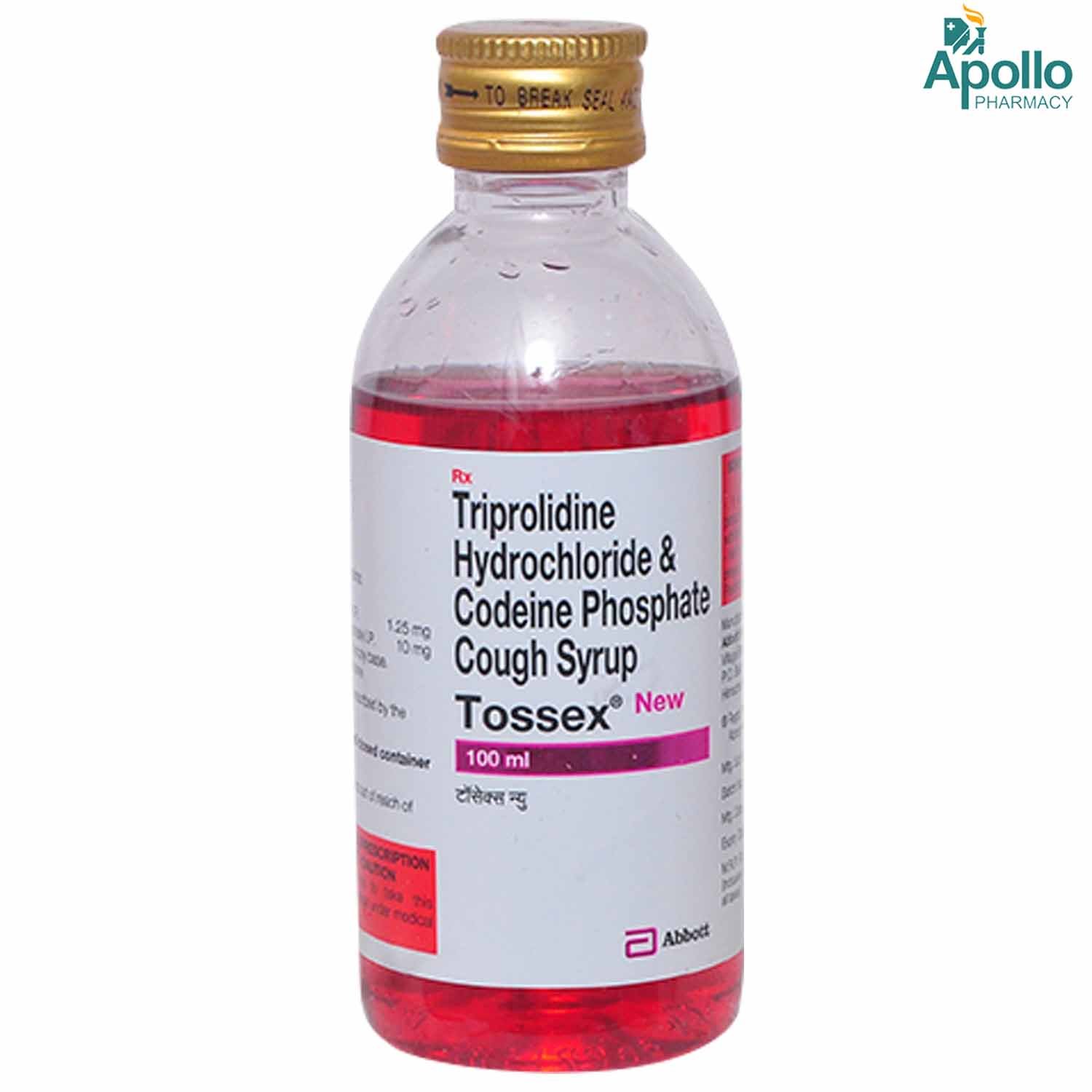Magnatuss T Syrup 100 ml
MRP ₹150.5
(Inclusive of all Taxes)
₹22.6 Cashback (15%)
Provide Delivery Location
Online payment accepted
 Prescription drug
Prescription drugWhats That
Composition :
Manufacturer/Marketer :
Consume Type :
Expires on or after :
Return Policy :
About Magnatuss T Syrup
Magnatuss T Syrup belongs to a class of medication called ‘cough and cold preparations’ primarily used to treat dry cough associated with a common cold or upper respiratory allergies. Coughing (dry or productive) is the body’s way of clearing irritants (like allergens, mucus, or smoke) from airways and preventing infection. There are two types of coughs: Dry cough and chesty cough. A dry cough is tickly and doesn't produce any vicious or thick mucus, while a chesty cough (wet cough) means mucous or sputum is produced to help clear your airways.
Magnatuss T Syrup is a combination of two drugs: Codeine (cough suppressant) and Triprolidine(antihistamine). Codeine belongs to the class of cough suppressants that blocks the μ-opioid receptor in the brain that produces cough, thereby decreasing the urge to cough. Triprolidine belongs to the class of antihistamines (anti-allergic drugs) that works by blocking the action of histamine, a substance responsible for causing allergic reactions.
Take Magnatuss T Syrup as prescribed by your doctor. Take Magnatuss T Syrup for as long as your doctor has prescribed it for you, depending on your medical condition. In some cases, you may experience certain side effects, including drowsiness, dry mouth, vomiting, blurred vision, constipation, dizziness, or tiredness. Most of these side effects of Magnatuss T Syrup do not require medical attention and gradually resolve over time. However, if the side effects persist or worsen, please consult your doctor.
Please tell your doctor if you are allergic to Magnatuss T Syrup or any other medicines. Drink plenty of fluids while taking Magnatuss T Syrup to loosen mucus and protect yourself from being dehydrated or overheated during exercise. In hot weather, as Magnatuss T Syrup contains Triprolidine, it decreases sweating and increases heatstroke risk. Do not take Magnatuss T Syrup if you are pregnant or breastfeeding, as it may cause adverse effects on the baby. Magnatuss T Syrup is not recommended for children below 18 years of age. Do not take Magnatuss T Syrup if you have taken an MAO inhibitor (anti-depressant medication like Isocarboxazid, Phenelzine, Selegiline, and Tranylcypromine) in the last 14 days, as it may cause life-threatening drug interaction. Magnatuss T Syrup is a habit-forming drug, and hence there is a risk of dependence on Magnatuss T Syrup . So, before stopping Magnatuss T Syrup , contact a doctor as it may cause withdrawal symptoms like anxiety, increased heart rate, tremors, or general unwell feelings.
Uses of Magnatuss T Syrup
Directions for Use
Key Benefits
Magnatuss T Syrup is a combination of two drugs: Triprolidine and Codeine. Triprolidine belongs to the class of antihistamines (anti-allergic drugs) that works by blocking the action of histamine, a substance responsible for causing allergic reactions. It helps provide relief from allergy symptoms such as sneezing, running nose, watery eyes, itching, swelling, congestion, or stiffness. Codeine belongs to the class of narcotic cough suppressants that block the μ-opioid receptor in the brain that produces cough, thereby decreasing the urge to cough. Magnatuss T Syrup is used to treat cough associated with a common cold or upper respiratory allergies.
Storage
Drug Warnings
Please tell your doctor if you are allergic to Magnatuss T Syrup or any other medicines. Do not take Magnatuss T Syrup for a prolonged time, Magnatuss T Syrup contains codeine that may lead to mental or physical dependence on Magnatuss T Syrup . Do not take Magnatuss T Syrup if you are pregnant or breastfeeding, as it may cause adverse effects on the baby. Magnatuss T Syrup is not recommended for children below 18 years of age. Do not use this medicine if you have used an MAO inhibitor in the past 14 days, as a dangerous drug interaction could occur. Magnatuss T Syrup should be taken with extreme caution in patients who have a history of alcoholism or drug abuse. Drink plenty of fluids while taking Magnatuss T Syrup to loosen mucus and protect yourself from being dehydrated or overheated during exercise. In hot weather, as Magnatuss T Syrup contains Triprolidine, it decreases sweating and increases heatstroke risk. If you have high blood pressure, fits, glaucoma, hyperthyroidism (overactive thyroid), chronic bronchitis, asthma, cough with mucus, cough caused by smoking, chronic bronchitis or emphysema (a lung condition causing shortness of breath), chronic obstructive pulmonary disease (COPD), blockage in stomach or intestines, kidney, liver, heart or urinary problems, inform your doctor before taking Magnatuss T Syrup .
Drug-Drug Interactions
Drug-Drug Interactions
Login/Sign Up
Taking Magnatuss T Syrup 100 ml and Potassium citrate (in tablet or capsule form) together can increase the risk of stomach ulcers, bleeding, and gastrointestinal injury.
How to manage the interaction:
Taking Magnatuss T Syrup 100 ml with Potassium citrate is not recommended, as it may lead to an interaction, it can be taken if prescribed by the doctor. However, if you experience severe stomach pain, bloating, sudden lightheadedness or dizziness, nausea, vomiting (especially with blood), decreased hunger, or dark, tarry stools, consult the doctor immediately. Do not discontinue any medications without a doctor's advice.
Co-administration of Clobazam with Magnatuss T Syrup 100 ml may lead to serious side effects like respiratory distress.
How to manage the interaction:
Consult the doctor if you are taking Clobazam with Magnatuss T Syrup 100 ml. Avoid driving or operating hazardous machinery. However, if you experience any symptoms such as dizziness, drowsiness, difficulty concentrating, and impairment in judgment, reaction speed, and motor coordination, consult a doctor. Do not exceed the doses and duration prescribed by your doctor. Do not discontinue any medications without consulting a doctor.
Using Lurasidone together with Magnatuss T Syrup 100 ml can cause central nervous system depression (a physiological state that can result in a decreased rate of breathing, decreased heart rate, and loss of consciousness).
How to manage the interaction:
Despite the fact that lurasidone and Magnatuss T Syrup 100 ml interact, it can be taken if prescribed by a doctor. Consult a doctor if you develop dizziness, drowsiness, difficulty concentrating, or problems in judgment, reaction speed, or movement control. Do not discontinue any medications without consulting a doctor.
Using Magnatuss T Syrup 100 ml and Pentazocine may increase the risk of breathing problems.
How to manage the interaction:
Although taking Pentazocine and Magnatuss T Syrup 100 ml together can evidently cause an interaction, it can be taken if your doctor has suggested it. However, if you experience any unusual symptoms contact your doctor immediately. Do not stop using any medications without first talking to your doctor.
Using Aripiprazole together with Magnatuss T Syrup 100 ml can cause central nervous system depression (a physiological state that can result in a decreased rate of breathing, decreased heart rate, and loss of consciousness).
How to manage the interaction:
Although taking Aripiprazole and Magnatuss T Syrup 100 ml together can cause an interaction, it can be taken if a doctor has suggested it. However, if you notice trouble breathing, feeling too sleepy or dizzy, having trouble focusing, consult a doctor right away. Do not exceed the doses, frequency, or duration of usage advised by a doctor. Do not stop using any medications without talking to a doctor.
Combining Olanzapine with Magnatuss T Syrup 100 ml can cause central nervous system depression such as OLANZapine can lead to serious side effects including respiratory distress, intestinal obstruction, fecal impaction.
How to manage the interaction:
Although taking Olanzapine and Magnatuss T Syrup 100 ml together can lead to an interaction, it can be taken if your doctor has suggested it. If you experience any symptoms like feeling tired, having trouble breathing, feeling dizzy or drowsy, difficulty focusing, taking pain or cough medications, constipation, blockage in your intestines, difficulty passing stool, hard or dry stool, less frequent bowel movements, stomach problems, feeling sick, feeling bloated, having stomach pain, or swelling contact the doctor immediately. you should avoid driving or operating hazardous machinery until you know how they affect you and do not discontinue any medications without consulting your doctor.
Co-administration of diazepam with Magnatuss T Syrup 100 ml may cause serious side effects.
How to manage the interaction:
Consult your doctor if you are using diazepam and Magnatuss T Syrup 100 ml. The doctor may prescribe alternatives that do not interact, dose adjustment, or more frequent monitoring to safely use both medications. Do not discontinue the medication without consulting a doctor.
Using Tapentadol together with Magnatuss T Syrup 100 ml can increase the risk or severity of side effects like decreased breathing rate, irregular heart rhythms, or problems with movement and memory.
How to manage the interaction:
Taking Magnatuss T Syrup 100 ml with Tapentadol can result in an interaction, it can be taken if your doctor has advised it. Contact a doctor immediately if you experience signs such as drowsiness, lightheadedness, palpitations, confusion, severe weakness, or difficulty breathing. Do not discontinue any medications without consulting a doctor.
Taking Risperidone and Magnatuss T Syrup 100 ml may increase the risk of brain related side effects.
How to manage the interaction:
Taking Risperidone and Magnatuss T Syrup 100 ml together can possibly result in an interaction, it can be taken if your doctor has prescribed it. However, consult the doctor immediately if you experience symptoms such as dizziness, drowsiness, difficulty concentrating, and impairment in judgment, reaction speed and motor coordination. Do not stop using any medications without consulting doctor.
Co-administration of Baclofen with Magnatuss T Syrup 100 ml can increase the risk of side effects.
How to manage the interaction:
Although there is an interaction, Baclofen can be used with Magnatuss T Syrup 100 ml if prescribed by the doctor. These medications may cause dizziness, drowsiness, shortness of breath, or palpitations, consult a doctor immediately. Do not stop any medication without a doctor's advice.
Drug-Food Interactions
Drug-Food Interactions
Login/Sign Up
Diet & Lifestyle Advise
- Avoid dairy products such as milk as they may increase mucus production. Also, avoid processed or refined foods to have relief from cough. Instead, replace baked foods, fried foods, white bread, white pasta, French fries, sugary desserts, and chips with green leafy vegetables.
- Drink plenty of fluids to avoid dry throat while you cough and loosen mucus.
- Avoid citrus fruits as they may worsen the cough. Eat fruits rich in water content, such as pears, watermelon, peaches, and pineapples.
Side Effects of Magnatuss T Syrup
- Dizziness/Drowsiness
- Mood changes
- Tiredness/weakness
- Nausea and Vomiting
- Increased heartbeat
- Loss of appetite
- Headache
- Blurred vision
- Dry mouth
- Constipation
- Urinary retention
- Coordination problems
Habit Forming
Therapeutic Class
All Substitutes & Brand Comparisons
RX
Out of StockNot for online saleCodistar-T Syrup 100 ml
Mankind Pharma Pvt Ltd
₹119
(₹1.07/ 1ml)
21% CHEAPERRX
Out of StockNot for online saleLecof-C Syrup 100 ml
Maxamus Pharma Pvt Ltd
₹130
(₹1.17/ 1ml)
13% CHEAPERRX
Not for online saleC-Kof Cough Syrup 100 ml
Dwd Pharmaceuticals Ltd
₹118
(₹1.18/ 1ml)
13% CHEAPER
Drug-Diseases Interactions
Drug-Diseases Interactions
Login/Sign Up
FAQs
Drug-Drug Interactions Checker List
- FEXOFENADINE
- DEXTROMETHORPHAN
- DIPHENHYDRAMINE
- BROMPHENIRAMINE
- CETIRIZINE
- DULOXETINE
- SERTRALINE
- PAROXETINE
- CARBAMAZEPINE
- PHENYTOIN
- CLONAZEPAM
- NITRAZEPAM
- LORAZEPAM
- FLUVOXAMINE
- ALPRAZOLAM
- DIAZEPAM
- OXYCODONE
Special Advise
- Do not take Magnatuss T Syrup for a prolonged time as it may lead to mental or physical dependence on Magnatuss T Syrup .
- To avoid getting addicted to this drug, take it in prescribed quantities and as directed by your doctor. Do not self-medicate.
- Magnatuss T Syrup causes drowsiness. Avoid doing activities that require your complete focus and attention, like driving when on this drug.
- An abrupt stoppage of Magnatuss T Syrup can lead to significant withdrawal symptoms. Always discuss with your doctor about decreasing the dosage before completely stopping its usage.
- Avoid consuming alcohol while on this medication, as it can lead to dangerous side effects.
- Magnatuss T Syrup is unsafe for usage if you're pregnant or plan to get pregnant and breastfeed. Discuss with your doctor in such situations about changing/replacing the medicine with safer alternatives.
Disease/Condition Glossary
Cough: Coughing is the body’s way of clearing irritants (like allergens, mucus, or smoke) from airways and preventing infection. Coughs may be dry or productive. A productive cough (wet cough) brings sputum (phlegm, mucus, and other matter) from the lungs. Cough is commonly caused as a response to allergy or viral infection but coughing up mucus is possibly an indication of infection in the respiratory tract. If you are coughing thick, solid white mucus, it indicates you may have a bacterial infection in the airways. If the mucus is clear or light-coloured, it indicates you may have allergies or minor infections in the respiratory tract, and yellow or green mucus indicates a respiratory infection.

Have a query?
Alcohol
Safe if prescribed
Avoid consumption of alcohol with Magnatuss T Syrup as it may increase the risk of drowsiness and other adverse effects.
Pregnancy
Consult your doctor
Magnatuss T Syrup is not recommended for use during pregnancy. Magnatuss T Syrup can have some harmful effects on the baby (fetus). Please consult your doctor. Your doctor will weigh the benefits and potential risks before prescribing it.
Breast Feeding
Consult your doctor
Magnatuss T Syrup may be excreted in breast milk and cause harm to your infant. Therefore, Magnatuss T Syrup should not be used while breastfeeding without a doctor’s advice.
Driving
Safe if prescribed
Magnatuss T Syrup may cause dizziness, drowsiness, blurred vision, or impaired thinking in some people. Therefore, drive only if you are alert after taking Magnatuss T Syrup .
Liver
Consult your doctor
Take Magnatuss T Syrup with caution, especially if you have a history of liver diseases/conditions. The dose may be adjusted by your doctor if required.
Kidney
Consult your doctor
Take Magnatuss T Syrup with caution, especially if you have a history of kidney diseases/conditions. The dose may be adjusted by your doctor as required.
Children
Safe if prescribed
Magnatuss T Syrup is not recommended for children below 18 years of age.













